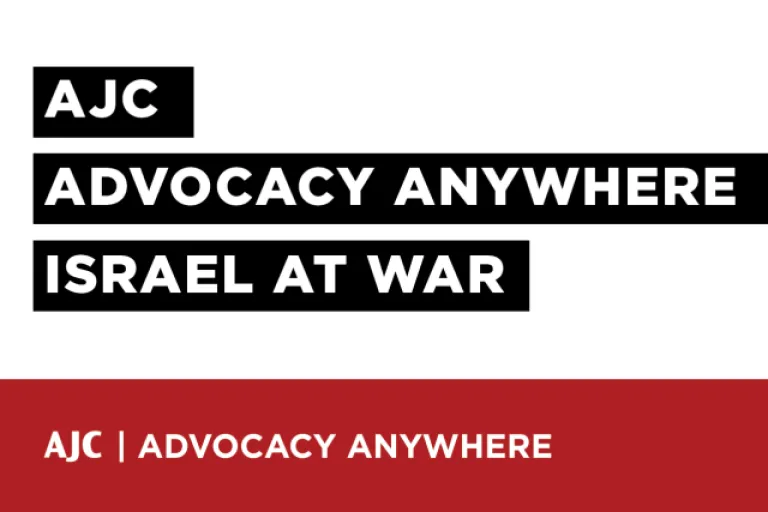June 6, 2017 — Washington, D.C.
Five American high school seniors, alumni of AJC’s innovative Leaders for Tomorrow (LFT) program, met recently in Jerusalem with Israeli Prime Minister Benjamin Netanyahu. The video of their conversation was shown today at the AJC Global Forum, the premier Jewish advocacy organization’s signature annual event.
“Our conversation with the Prime Minister left us feeling reassured that our education and training would serve us well,” said Ryan Berger of New York, who will attend the University of Pennsylvania in the fall. Berger first conceived of the program that AJC launched in September 2015. To date, 80 high-school students in New York and Chicago have participated in LFT, learning to be effective advocates for Israel. Next year the LFT program will expand to Atlanta and Westchester, in addition to Chicago and New York.
Berger asked the prime minister his advice on the best way to keep young American Jews excited about being advocates for the Jewish people. Netanyahu said education is crucial. “We live in a modern age where history goes back to breakfast if you are lucky,” he said, noting that especially on campuses, people “say things about Israel that are ridiculous,” the one democracy in the large Middle East region “is described as illiberal, as anti-democratic.”
He encouraged the students to “combine conviction with fact,” as they “confront people who are swept into positions that defy facts, knowledge, and common sense.” To emphasize his points, the prime minister drew a herd of sheep on a piece of paper, symbolizing the groupthink against Israel that occurs on some campuses. “Leadership is going against this nonsense,” he said. “Go against the lies, tell the truth about Israel. You have nothing to hide. You have everything to be proud of.”
Ali Malehorn of Chicago, who will attend the University of Michigan, asked the prime minister what the benefits are for other countries in partnering with Israel. Netanyahu said he meets in Israel with 250 world leaders each year. “Why do they come here? They know the truth about Israel. They know it is a force for progress, for security, for peace, for stability. But they also know it is a force for technology,” said Netanyahu.
The revolution that led Israel to become a preeminent leader in hi-tech is “the story you may not get on college campuses,” he said. It began with the French arms embargo imposed on Israel in 1966, an event that accelerated the buildup of Israel’s defense industry and also created the basis for civilian spinoffs. Significant changes in the Israeli economy that allowed for the expansion of civilian technology companies made “technology and market-friendly a potent combination,” he said.
William Scherr, who will attend Cornell University, asked about Israel’s relations with the Gulf states. These Arab countries “see Israel as their indispensable partner in fighting” the twin threats of Iran and ISIS, said Netanyahu. “Ultimately, it may eventually open the door to not just change in the relationships of governments, but also to begin to change a perception of Israel in the Arab street” that may lead to cooperation in water resources, agriculture, transportation, and air pollution, he added.
“These are the first cracks that I have seen in this wall of hostility against Israel for many decades,” said Netanyahu. “But that hasn’t happened at all in the Palestinian street because they constantly feed horrible slanders against us.”
Molly Shapiro, who will attend Yale University, asked the prime minister what has influenced his leadership of the country. Netanyahu said he was “powerfully motivated by the few years I spent in the United States as a teenager.” That experience later influenced his decisions to reform the Israeli bureaucracy and economy. The country’s economic potential was unleashed when “the boot of overregulation” was removed, he said. With the Israeli economy growing at roughly 5 percent a year for the last 12 years, and per capita income reaching $40,000, “we are going to pass Japan,” he said.
Brett Zaslavsky of Chicago, who will attend University of Michigan, asked the prime minister about his vision for Jerusalem. “We are the only people that view Jerusalem as their capital,” said Netanyahu. “Given that 3,000 years ago King David established the Jewish capital here, it resonates with us and gives us hope for the future.”
The prime minister further emphasized that “only under Israel, only in the last 50 years since Israel became the sovereign power over the religious sites, all three faiths have had unimpeded access to their holy sites and unfettered ability to practice their faith.”
Citing the widespread destruction of Palmyra, a UNESCO World Heritage site, in Syria by ISIS as one example, Netanyahu emphasized that “there is no contradiction between Israel’s sovereignty in Jerusalem and religious freedom. There is, in fact, an absolute dependence on that. If Israel was not here, who knows what would happen to the shrines here.”
More than 2,500 participants from across the United States and 70 countries around the world are attending the annual AJC Global Forum, taking place June 4-6, in Washington, D.C.


